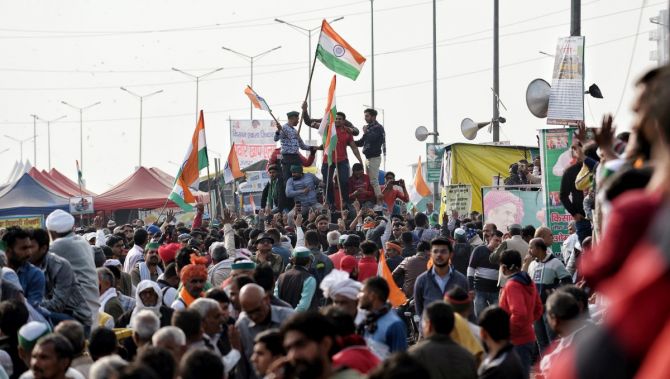The government and the farmers must come back to the negotiating table with only the interest of the country in mind, suggests Vivek Gumaste.

The farmers protest is a national calamity, a Shakespearian tragedy of gargantuan magnitude wherein a well-intentioned government finds itself inadvertently pitted against an army of simple-minded farmers who rightly or wrongly believe that their interests are being jeopardised by the three farm laws passed by the Modi government in September.
This confrontation has been vitiated to some degree by a complex set of duplicitous dynamics orchestrated by marginalised vested interests who see in this an opportunity to further their own anti-government agenda.
With the shocking events of January 26, the hitherto peaceful protest has taken an ominous turn with the potential to snowball into something far bigger, far different and far more serious than what its leaders had imagined.
On January 26, at least momentarily, vandalism took centre-stage and unruly elements seized the initiative to script a frightful narrative that saw the hallowed symbol of our national independence being desecrated.
As the situation stands now there are no winners in sight. If no solution is reached, the government, the farmers and the nation as a whole stand to lose.
We are at a dangerous and critical crossroad and it is imperative that we salvage the situation. Both the government and the farmers must take a step back, do some serious introspection and come back to the negotiating table with only the interest of the country in mind.
For that to happen, a lucid analysis of the events so far is vital.
The label 'protest' by itself does not sanctify an opposing view or make it right. To be valid, a protest must be grounded in facts and logic, driven by good intentions and conform to the principle of non-violence.
There is near unanimity among experts that the agricultural sector in India is in need of dire reform and most people in the know do agree that the changes incorporated in the farm laws will have a salutary effect on farmers.
The farmers, however, are not convinced and appear to have genuine concerns about the impact of these reforms. Therefore, the government is duty bound to allay their apprehension.
To an impartial observer the government does not come across as insensitive. In fact, the government has had 11 rounds of talks with farmers and has made several generous offers that include a written assurance on the MSP, parity between APMC markets and private markets through similar cess, registration of private traders, dispute resolution via civil courts, continuation of electricity subsidies and others.
As a last resort the government has even agreed to put the laws on hold for 18 months. This message was reiterated by none other than Prime Minister Modi himself when he addressed an all-party meeting on January 30, which offer he reiterated on February 1.
The government has tried to reach out to the farmers in the current Budget as well.
Budget 2021 allows APMCs access to the agriculture infrastructure fund (AIF) for development of marketing infrastructure in mandis to put to rest the concerns of farmers regarding the viability of mandi sin the new environment.
Speaking after the Budget was presented Modi asserted: 'Budget 2021 has a special focus on strengthening the agriculture sector, boosting farmers' income. Villages and farmers are at its heart. It has provisions for further strengthening APMC mandi through the Agriculture Infrastructure Fund and budget for the MSME sector has been more than doubled to boost its growth and create more employment opportunities.'
The Supreme Court too has intervened in this matter. Calling its own order 'extraordinary', the court stayed the implementation of the three laws and set up an expert committee to hear both sides of the matter.
The directive to the four-member committee of experts was 'to listen to the grievances of the farmers on the farm laws and the views of the government and make recommendations'.
The overall approach of the government has been one of accommodation and restraint.
During the fracas on Republic Day, the Delhi police were under strict orders not to fire despite any provocation; no less than 350 police personnel suffered injuries as they tried to maintain control without resort to force: a testimony to the respect that the government has for the farmers.
A protest on this scale is an open invitation to anti-social elements and our hostile neighbours to fish in troubled waters, and it is the responsibility of the organisers to exhibit appropriate caution in strategising their protest.
Intelligence reports indicated that over 300 Twitter handles had been generated in Pakistan between January 13 and 18 to create disturbance during the tractor rally.
The call for a chakka jam on February 6 provides another opportunity for anti-social elements to hijack the movement and is a recipe for violence and chaos. The farmer leaders must rethink this matter and call it off before it is too late.
The Sikhs, who form the bulk of the protestors, are a hard-working, sincere and upstanding community whose contribution to Indian society and the nation from Mughal times to the present is invaluable and unrequitable; they are the first among equals.
But let us be clear about one thing. This is not a Sikh issue and let us not make it one. The government must reign in its loose cannons and refrain from making comments that can even obliquely be interpreted as divisive. The media, the Opposition and the protestors, on their part as well, must exhibit due responsibility in this regard.
Negotiations involve give and take. Negotiations do not mean coming to the table to serve an ultimatum on the other side flaunting the motto 'It's my way or the highway'.
The maximalist demand for repeal of the laws has more important implications than a mere ego setback to the government. Such a decision would be tantamount to a body blow to the democratic process and erode the power of Parliament.
Additionally, it would set a bad precedent for the future. The message that would go out is that street politics is supreme and can trump constitutionally enacted laws.
The government is bending over backwards to accommodate the farmers, the police have shown extraordinary restraint and the Supreme Court has stepped in to ensure that justice is done to them. The farmers must appreciate and respond to these gestures in a spirit of unity and to restore their own credibility.
One farmer leader, Balbir Singh Rajewal, president of the Bharatiya Kisan Union, rightly commented:'We should keep in mind that we are not going to war. This is our country and our government.'
The Supreme Court's intervention is a face-saving measure for both parties. The court concluded that farmers' bodies should 'perceive' the 'extraordinary' stay as an achievement of their peaceful protest 'at least for the present'.
'It also exhorted the organisers to 'encourage' their members to go home to their livelihoods, and thus, protect their lives and health and that of others too.
Both the government and the farmers must heed this sane advice in the interest of the nation. That is the only way forward.
Academic Vivek Gumaste, who is based in the United States, is the author of My India: Musings of a Patriot. You can e-mail the author at gumastev@yahoo.com











 © 2025
© 2025